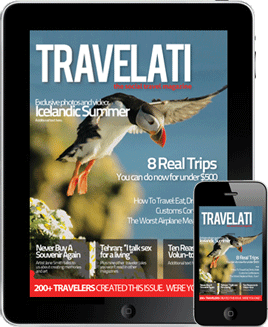Everyone loves a good social media experiment—especially when it involves free stuff.
Travelati, an upcoming travel magazine, is giving away tons of freebies for the best travel tips and unique stories. They’re crowdsourcing all of their content, so travelers can receive American Airlines Advantage miles, airline gift cards and lounge access in exchange for the best photography, video, writing and spoken word. If you’re not a writerly type but still want a shot at magazine fame, you can phone in your story.
Everyone loves a good social media experiment—especially when it involves free stuff.
Travelati, an upcoming travel magazine, is giving away tons of freebies for the best travel tips and unique stories. They’re crowdsourcing all of their content, so travelers can receive American Airlines Advantage miles, airline gift cards and lounge access in exchange for the best photography, video, writing and spoken word. If you’re not a writerly type but still want a shot at magazine fame, you can phone in your story.
 The magazine, designed for the iPad, will hit digital newsstands on April 1st.
The magazine, designed for the iPad, will hit digital newsstands on April 1st.
Crowdsourcing magazine content isn’t a new idea, but it hasn’t been a very successful one, either. It tough to find the perfect balance of print and web media, especially when the world is shifting towards digital favouritism.
In 2009, San Francisco startup, 8020 Publishing, shut its doors after 2 years of business. Their business model was simple—take user generated content, let users select the best and then create a professional looking print product. They published two magazines both in print and online: JPG (photography) and Everywhere (travel).
Before 8020 went out of business, they were rocked by scandal. Basically, the investors decided to erase the true history of JPG, including the names of the founders, and removed the original six issues from the site. The founders, not wanting to stay in a place they weren’t wanted, quit the business.
The problem with running a crowdsourced company is that scandal will spread like wildfire. Users took photos of their deleted JPG accounts, posted blogs and wrote thousands of comments defending the true history of the company. Many employees left, and 8020 shut down shortly after.
8020 has since found new investors, but they ditched Everywhere to focus mainly on JPG. Everywhere’s website still exists, but only as place to share travel stories and photos.
This is where Travelati comes in.
I haven’t seen an actual issue yet, but Travelati seems to get what the travel community is all about. By nature, travelers are social. Everyone has a story they’re dying to tell, or a story they’re dying to read. They want to share tips, show their weird photos and tell the world about their random situations. But they also don’t want to lug around 5 different guidebooks for the duration of their trip.
Travelati only publishes in digital format so travelers can read real stories from real travelers, whenever and wherever they want. And the mix of styles will keep the content fresh—some travelers want to read short blurbs on where to eat and what to see, while others prefer in-depth feature length articles or narrative pieces.
Travelati is filling a niche, so hopefully it’ll be around for a while. There’s a ton of user-generated travel information on the internet, but none that comes in a tidy, professional package. You won’t have to wade through hundreds of comments or weed out the sponsored recommendations. All you have to do is relax, read some stories and let the travel inspiration flow.







